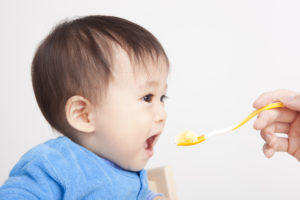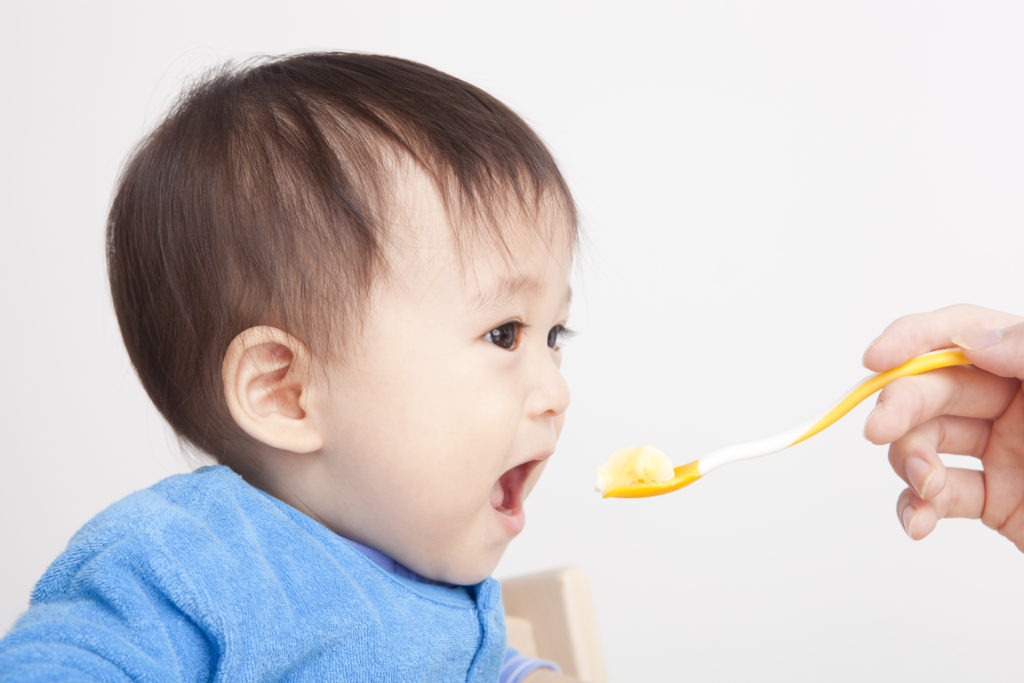* This article is an excerpt from and is edited based on a lecture & consultation meeting titled “How to Communicate with and Discipline Small Children” which was held in 2019.
* This article is also available in Japanese and Chinese.
Q: I’m concerned that my child won’t eat her meals. (age 1)
My child is self-assertive, and she is adamant about not eating anything she dislikes. If I make her eat, she will spit out the food. She won’t eat fruits or any of the western-style food like stew, and I don’t know what to do. She’s in a pre-school class for 0 year-olds and teachers have been considerate of her food preference, but once she begins class for 1 year-olds, there will be snack time, and if she can’t eat any of the snacks, I’m worried that she won’t be full.

A:
Children will eat different things as they grow, so you can expect her to eat eventually.
Eating should be enjoyable. If she enjoys eating, she’ll have more appetite. But when she’s forced to eat, she will get nervous and it would further discourage her from eating. So, telling her to “eat this, eat that” will have quite an opposite effect.
There is a woman I met who was in her late twenties; the only vegetable she was able to eat was shiraga negi (thinly sliced Japanese green onion). Her mother wanted her to grow up to have no food dislike, so her mother made her try all sorts of food when she was little. It made her not eat vegetables at all. But, as much as her mother wanted her to eat vegetables, she never prepared shiraga negi for a child who was around 2-3 years old. As the woman was never forced to eat it, it became the only vegetable she could eat. She was forced to eat everything, but she ended up rejecting everything. Her heart rejected them.
As such example shows, it’s better to stop making efforts to make your child eat.
If there is an elder sibling who doesn’t like eating vegetables and the mother tells him/her “eat this”, then that child will turn out to be like the woman mentioned earlier, but the younger sibling who has observed this will learn that eating vegetables will make the mother happy, so they will eat anything their elder brother/sister is reluctant to eat.
That’s how much of a psychological effect eating has on children.
The best thing to do is for the father and the mother to enjoy eating meals in front of their children.
Children generally want to copy grown-ups, so when the father and the mother have conversations like “I don’t get why the children don’t think this food is so tasty”, children will start to eat them because they’re curious why their parents think this bad tasting food is good.
Also, when your child eats something that she doesn’t like, even if it’s a bite, compliment her by saying “good job for taking a bite” or “it makes me happy that you ate the food I cooked”, etc.
Making their mother happy is an enough motive for children. Acknowledging your child’s food preference and your child’s feelings when she eats things she doesn’t like will encourage her to eat, as well as your child understanding that making an effort to eat one bite or even half a bite will make you happy.
Above everything else, children just want to make their mother happy. Making their mother happy is the best way to make children delighted.
Telling your child that it makes you happy to see her take a bite should positively affect her eating behavior, so you should enjoy the process of teaching her the pleasure of eating food.
……………………………………………………………………………………………………….
Advisor: Ms. Ryoko Uchida (Psychology Counselor for children)
Since 1973, Ms. Uchida has continuously held counseling sessions at multiple healthcare centers in Tokyo. In addition, since 1998, she has presided over <<Momo’s Room; Child Counseling>> and has held group consultation for truancy, delinquency and withdrawal. Ms. Uchida is also a part-time lecturer at Rikkyo University, a widely known advisor for NHK Radio phone counseling on children’s psychology and a speaker at numerous seminars at child care circles, parents’ groups on truant children, and kindergartens across Japan.
(Translated by Wakana Goto)
